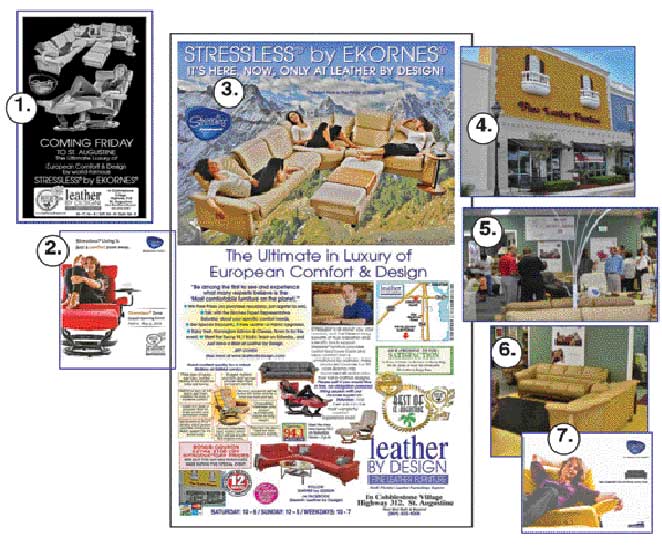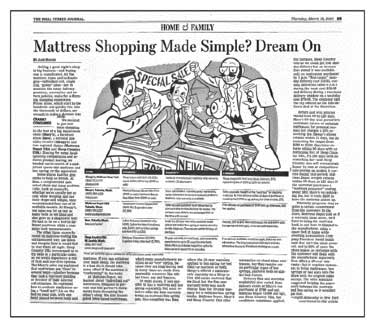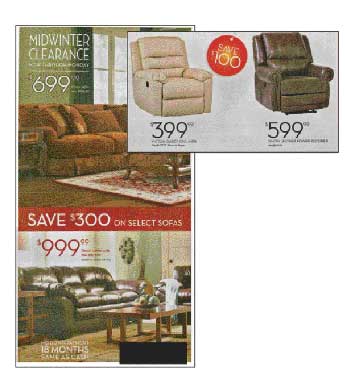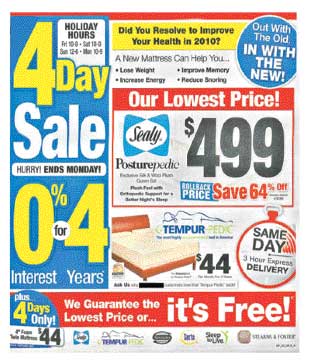Learn to deliver the four magic sentences that will relieve your customer's pain and you will sell more furniture.
It’s difficult to feel someone else’s pain. We all have our own pain. And, if you are a furniture entrepreneur, you have plenty of pain of your own. Being an independent furniture dealer has always been difficult. In recent years, conditions have been close to lethal. Many stores have disappeared. Even if you are a franchise for a big chain, you have felt the squeeze.
Retail furniture people amaze me. Especially the CEOs. They are required to be brilliant merchants, buyers, display experts, managers, psychologists, charming customer service experts, salespersons, master motivators, advertising and marketing experts, and on and on. Continual advancements in technology seem impossible to keep up with. And a new kid on the block is the IT expert. If you are small, it is usually a young person who makes and hosts your website and can be a challenge to work with. If you are a franchise, and you have an IT department to deal with, it can be even worse. They are so busy putting out fires that they are not able to pay attention to any request for creative ideas you might have for effective web marketing.
How are you going to take time out to feel a customer’s pain?
So, you keep promoting as you always have. And, let’s face it, your ads and flyers look like everyone else’s. You don’t stand out. If you believe that fewer and fewer people are getting your marketing messages, you are correct. We live in an attention-deficit world. People are tired of being “targets” and “things” and they are tired of the hype. They are simply tuning out intrusive media. Advertising as we know it is rapidly dying. And the furniture industry seems to be the last to know that traffic must be generated by completely new media choices, mixes and methods.
And herein lies the great opportunity for the independent, because “corporate think” cripples the big box chains. With very little expense you can immediately begin multiplying the effectiveness of your marketing. While competitors are shivering in their boots and big chains remain puzzled, you can surge ahead and grab lots more market share, and never look back.
This is not a theory, it is established, tested fact. And by the time you finish reading this series of articles, you will know exactly how to do it. Learning to feel and understand your prospective customer’s pain can transform you from a stranger hawking furniture to the trusted home furnishings maven in your market area. And your brand will be increasingly successful at seizing attention and getting noticed; because you will be saying and doing something more interesting and content rich than everyone else. You will discover and dominate a “Blue Ocean” niche in home furnishings and convert your store into an ultimate selling machine.
While the above may also sound like hype, it is not. However, what I propose will not be easy. Most furniture people are on a treadmill of going from one promotion to the next. They are tacticians who don’t have time, and will never have time, to plan a grand strategy. So they may read an article like this and then rush off and jump back on the treadmill of promotion. It doesn’t have to be that way. If you will take one hour a day to work on becoming a master strategist, (as I recommended in the recent Furniture World series, “Build a Home Furnishings Sales Machine”), this is what will happen: In one year you will have completed over nine forty-hour weeks solely devoted to a broad vision and strategy for your store. This will lift you to a level of effectiveness unmatched by your competition. You will stand out because only one entrepreneur in one hundred will do this. Isn’t this worth an hour a day?
NEW IDEAS COULD CHANGE EVERYTHING FOR YOU
About a year of research and testing went into this series of articles. If anyone should be concerned about the fact that traditional media is becoming less and less effective, it should be me. As a marketing consultant, it is my job to see the land mines ahead for the furniture industry. Believe me, the industry has never been more in need of some cautionary straight talk. Furniture advertising is the weakest it has ever been in my thirty-plus years of working in our industry. I will tell you why. There are five principle reasons why traditional media is less and less effective for home furnishings stores:
- Home furnishings advertising is, generally, hastily prepared by technicians who have no concept of the Evidence-Based Advertising principles that make advertising cost-effective and productive, or by harassed CEOs who lack the time and knowledge to create effective local ads.
- Home furnishings advertising is too often a sterile series of label headlines, price-item offers, and lacks personality. There is rarely, if ever, a credible USP (Unique Selling Proposition) that makes the store stand out from the crowd. The consumer’s question, “Why should I buy my home furnishings from you and not your competitor?” goes unanswered.
- Home furnishings websites are usually created and maintained by technicians who have no understanding of the principles that make written messages compelling. These sites are cold, and lack a dazzling USP, snappy videos and easy to find and follow content that informs and enlightens information-hungry potential customers.
- Most home furnishing stores grossly under-perform because the staff is not united in understanding the USP of the organization, nor its long-term mission, nor its short-term targeted goals. In addition, at least a dozen rich possibilities for potential plus-business are left unexplored.
- A store must establish itself as a trustworthy friend, the ultimate expert in home furnishings in its market area by clearly expressing the values it shares with the community in every aspect of its operations before its messages will be believed. Successful internet marketers understand this, but very few home furnishings stores are taking the steps necessary to achieve credibility.
Each of these issues will be addressed in turn. First, however, recall how this article began with a discussion of the pain you feel as a furniture retailer? But what about the potential customer’s pain? If you don’t spend time every day thinking about your customer’s pain your messages will reflect your indifference …and your messages will not stand out from the crowd and grab their attention.
PROSPECTIVE CUSTOMERS ARE HURTING TOO
I have often heard the complaint that today’s customer is the toughest ever. To a large extent, this is true. People no longer readily trust businesses, or their government, or their banks, or even their churches. So your communications must first of all embrace elements that inspire trust. When a prospect reads your ad, watches your commercial, or walks into your store, you are a stranger, and they are in pain.
Several years ago I told the story of the expert marketer who rented tuxedos and dominated a major market. This tale is so important to our discussion that it is worth repeating. Years ago during the heyday of Levitz, Herb Sperber rose from a novice floor salesperson to a remarkably successful general manager of a major Levitz furniture unit in California. Later he left Levitz to take over a chain of Tuxedo rental stores in Arizona. Discussing the difference between satisfying a furniture customer and a bridal customer, he made this distinction:
“Satisfying a furniture customer is a piece of cake compared to pleasing a bridal customer. If a furniture store makes a mistake, and the staff really hustles to correct it, the chances are they will be forgiven. But the bride is different. She has been planning her wedding since she was five or six years old. If I screw up her wedding, she will never, ever, forgive me. And she will tell at least two hundred other people how terrible I am. Moreover, a prospective bride is a tough sell. When she first comes into one of our stores, she is nervous. She is afraid …”
Herb went on to explain the four formidable issues that drive the pain of a prospective client. They are the same general issues that a prospective furniture store customer has. And these four concerns, or questions, dominate their attitudes, and make them fearful, distrustful and an arduous challenge to deal with.
Four Formidable Issues
- Will this stranger listen to their wants and needs carefully and sincerely strive to understand them?
- Will this stranger turn out to be a slick charlatan and convince them to purchase something they do not want, and will regret buying?
- Will the other strangers in this store keep their promises and will they follow through?
- Will my family, friends and neighbors admire the choices I make? Or will they tacitly or vocally ridicule them?
four Magic Sentences To Relieve Their Pain
Then Herb explained his four secret sentences that soothed the prospect’s pain and began to dissolve her fear:
“Larry, I pound into the heads of all our salespersons that they must memorize these statements and they absolutely must make them within the first few minutes of the initial conversation with a potential customer:
“I understand, Miss Smith. Let me assure you that I will listen carefully to you and I will do everything you want, but I won’t let you make a mistake. In addition, I promise you that our team is trained and experienced and will follow through flawlessly. And finally, when all is said and done, your friends and family will praise your choices and declare that you did yourself proud.”
Have your salespeople tweak this sentence to fit their personality. Make sure they deliver it. Your closes will go up measurably. Also, when you create a print advertisement, if you want to capture new clients, remember that you are a stranger. Does your advertisement have personality? Do you present yourself as a living, breathing human being who speaks with authority, gives lots of information, and seems to be trustworthy? Do you give a more generous and fair offer of satisfaction than your competitors to reverse the risk for your prospective customer? Or are you just another item-price hawker screaming low prices, with label headlines, no benefits, and an information-starved presentation? Improving your advertising messages will multiply their effectiveness. Remember the mantra of the internet gurus: “Content is king.”
MASS-PRODUCED ADVERTISING MEDIOCRITY
You read earlier about how most furniture advertising fails to answer the consumer’s question, “Why should I buy my home furnishings from you and not your competitor?”
If you examine the exhibits in this article you will see the flyers created by the big box stores have one thing in common. They all use label headlines. They sometimes mention product points but rarely, if ever, mention benefits. Every salesperson knows that you should never mention a specific product point without explaining the benefit it provides for the customer. Masters at selling use the “So what?” strategy to develop a winning sales process.
“This mattress has 800 premium steel springs and they are lavished with layers of foam so there is absolutely no coil feel.” “So what?”
“So they cradle your body in perfect comfort without pressure points that can disturb your sleep.” “So what?”
“So you will sleep better, and awake in the morning refreshed, energized, pain-free, and ready for anything.”
Note that the product points support benefits and make them credible. Otherwise they are just empty claims. And here is the master touch: The benefits support the ultimate desire of the customer for better health and less back pain. This process establishes the integrity of the product and the credibility of the expert salesperson.
SIDEBARS
Retail checklist Leather By Design used to start a killer introduction for a new vendor.

- Create a series of effective teaser ads featuring Ekornes.
- Plan a series of unique preferred customer mailings.
- Run a Powerful Introductory Ad. Note that this ad is content-rich, and loaded with benefits. It establishes the owner of Leather By Design, Jeff Cohen, as the preeminent leather expert in his market area. Recently, Jeff has unseated a much larger store to become “Best of St. Augustine.” Note also that Jeff displays an unparalleled promise of satisfaction that helps lift him from a stranger to the status of a trusted friend.
- Include Dynamic Signs (silent salespersons) outside and at point of purchase.
- Run a successful, well staffed private sale.
- Don’t forget tasteful, powerful displays.
- Make high-quality handouts available (no one left the store emptyhanded)!
- Missing from the list above is one more important factor: Pick a vendor that understands marketing. Leather by Design chose Ekornes for this promotion because the company has a mantra that drives their interface with furniture stores: “We are not a furniture company, we are a marketing company.” Indeed, they were passionate, professional, thorough, and cooperative with Jeff Cohen’s goals and advertising efforts.
Cranky Consumers Shop For A Mattress.

This article from the March 18th Wall Street Journal is sub-titled “Cranky Consumer” for good reason. The writer defines the prospect’s pain in the first few sentences: “Selling a good night’s sleep is big business—and buying one is complicated. All the mattress types and technologies—individual coil, single coil, ‘green’ latex—not to mention the many delivery promises, warranties and return policies, make for a dizzying shopping experience. Prices alone, which start in the hundreds and quickly rise into the thousands of dollars, are enough to make a shopper lose sleep.” Clearly the WSJ shoppers did not encounter any salespersons who established themselves as a trusted friend who was also the preeminent expert in mattress products. There was no “Unique Selling Proposition” established. And there was no clear “risk reversal” in the form of a simple promise of satisfaction. No wonder customers are confused and cranky!
When Expensive Media Is Used Like A Billboard, A Precious Opportunity Is Lost.

Home furnishings advertising too often lacks personality, and is often a sterile series of label headlines and price-item offers. There is rarely, if ever, a credible USP (Unique Selling Proposition) that makes the store stand out from the crowd. The consumer’s question, ‘Why should I buy my home furnishings from you and not your competitor?’ goes unanswered. Such lazy efforts are wasteful and grossly under-perform
Unsupported claims and a low price guarantee will not convince today’s savvy consumers.

Benefits that are not supported by credible product features sound like empty claims and promises. This ad run by a major bedding retail chain declares that a new mattress “can help you ... lose weight, improve memory, increase energy and reduce snoring.” Yet, there is no supporting information to validate these claims in the ad. The credit offer of 0% for four years sounds good, until you read the fine print on the back of the flyer that limits the offer to sales of $1,999 or more, in addition to other stipulations. Finally, the store guarantees, “the Lowest Price or it’s FREE.” If you look closely, there is a tiny “tt” by the lowest price statement. On the back side, in that tiny type, the customer finds that the guarantee is qualified. I doubt that much free merchandise is given away to happy customers who find it at a lower price. Is it any wonder that home furnishings prospects are paying less and less attention to hype?
Next Issue
In our next article we will explore the issues related to establishing yourself as the ultimate expert on home furnishings in your market. Famous marketing gurus Jay Abraham and Rich Sheveren term this the “Strategy of Preeminence.” They know whereof they speak, and I will explain this strategy to you. We will also explore techniques for turbo-charging your marketing with a killer Unique Selling Proposition. Everything begins with an inspired USP factor. I will explain how to develop yours in our next article.
Larry Mullins is a contributing editor for Furniture World and has 30+ years experience on the front lines of furniture marketing. Larry’s mainstream executive experience, his creative work with promotion specialists, and mastery of advertising principles have established him as one of the foremost experts in furniture marketing. His turnkey High-Impact programs produce legendary results for everything from cash raising events to profitable exit strategies. His newest books, THE METAVALUES BREAKTHROUGH and IMMATURE PEOPLE WITH POWER … How to Handle Them have recently been released by Morgan James Publishing. Joe Girard, “The World’s Greatest Salesman” said of this book: “If I had read Larry Mullins’ book when I started out, I would have reached the top much sooner than I did.” Larry is founder and CEO of UltraSales, Inc. and can be reached directly at 904.794.9212. See more articles by Larry at www.furninfo.com or www.ultrasales.com.